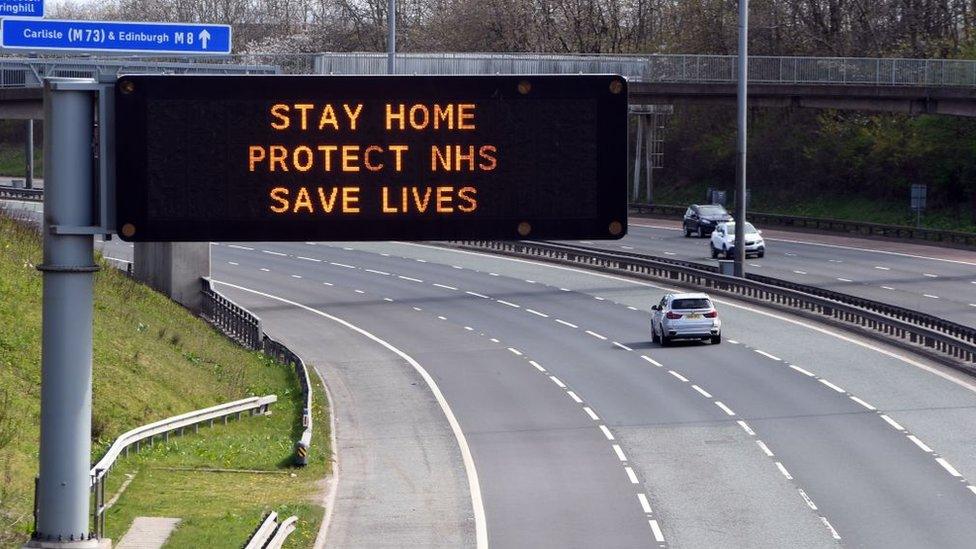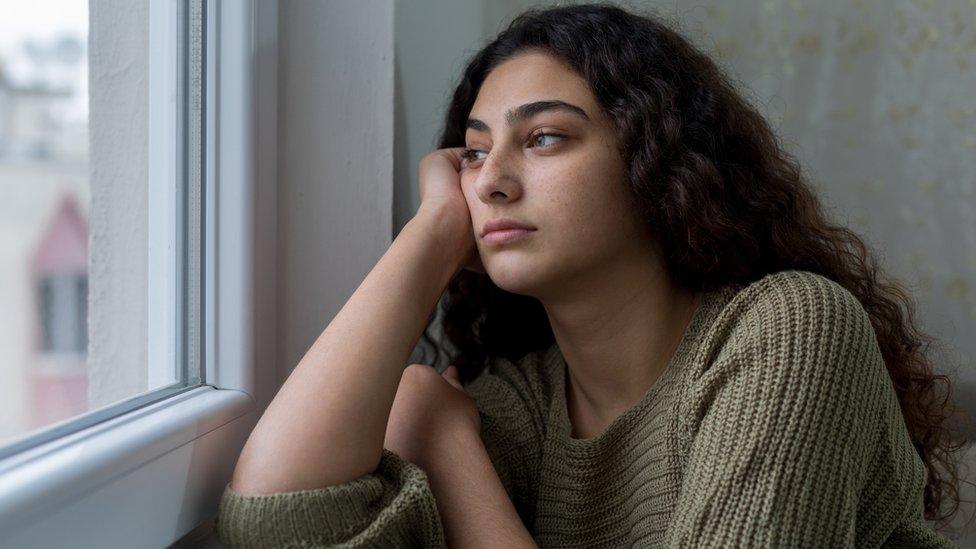Coronavirus: Do British people still accept the lockdown?
- Published
- comments

Many polled say they are obeying government advice due to fears of catching the virus
When lockdown first started in the UK in the final week of March there was widespread support for the measures aimed at controlling the coronavirus. But have attitudes changed?
The country is currently in its seventh week of the greatest curbs on daily life since World War Two.
The prime minister says the government will proceed with "maximum caution" regarding easing restrictions, when he speaks to the country on Sunday evening. However, surveys suggest a significant majority of the British public believe they could cope with the restrictions for another couple of months.
A new YouGov poll, external finds eight in 10 Britons (82%) reckon they could easily continue with the current lockdown until June.
Almost two-thirds (63%) say they would manage well until July, but 50% say they would struggle if they were still stuck indoors until August.
For the moment, there is not a public clamour for lockdown to end.
Another recent poll showed many would be uncomfortable leaving home, even if restrictions were lifted in a month's time.
More than 60% would be uncomfortable about going out to bars and restaurants or using public transport, the Ipsos Mori survey suggested., external
More than 40% would still be reluctant to go shopping or send their children to school and more than 30% would be worried about going to work or meeting friends.
The vast majority of people in the UK are obeying the lockdown rules - not because they have been ordered to by the government but because they don't want to catch or spread the virus.
Very few actively like being in lockdown, though.
Responses to a series of surveys over the last month suggest the country has gone from apprehension at the start through to dejection as the economy shrank and the death toll mounted. People have moved on to frustration in the most recent analysis as restrictions begin to grind and reality dawns as to how long they may last.

More people are on the roads than at the beginning of lockdown
There is no question that lockdown places a significant strain on households, but is the increasing frustration and boredom translating into exasperation? Are we reaching the point where people will start to ignore the rules?
Some newspapers and politicians have been suggesting the social distancing restrictions are beginning to fray, but the evidence points to a high level of compliance remaining.
There have been reports of a slight increase in numbers using their cars, but it is not clear what the reason for that might be. In part, it may be because more businesses are finding ways to open up and people are returning to work.
During the sunny Easter period more people returned to parks and green spaces, Google data suggests, external, although police said the vast majority sought to obey social distancing rules and activity was still well below pre-lockdown levels.
Analysis of surveys conducted by King's College in London suggests there are three broad groups when it comes to lockdown: accepting, suffering and resisting.
Just under half of people - 48% - are characterised as accepting, following the rules and coping reasonably well. At 44%, slightly fewer say they are struggling, often losing sleep, feeling anxious or depressed, but still overwhelmingly trying to obey all the rules.
The remaining 9% are resistant to the lockdown, with many of those believing too much fuss is being made about the virus and admitting they are less likely to follow the restrictions.

Younger people were more than twice as likely as over 65s to say they were not coping with lockdown
People tend to think social isolation will be most difficult for older people, but the survey evidence suggests the opposite is true. A survey conducted for insight company Britain Thinks finds 42% of 18-24-year-olds say they were not coping with lockdown, more than twice the proportion of those aged over 65.
Older people, of course, are likely to have seen less of a change to their lifestyle than the young. Their housing and income are likely to be more secure. Their social lives are less about going out to crowded bars and clubs, festivals and sports events.
Women appear to be struggling more than men in lockdown, perhaps a consequence of the tendency for them to take on a greater share of domestic responsibilities.
Unsurprisingly, poorer people are finding it tougher than those on higher incomes.
About 20% of people are worried about their mental health in lockdown, with 11% concerned about anxiety and 7% with concerns about depression, according to a survey conducted for the Academy of Medical Sciences and the mental health research charity MQ.
The behavioural science that forms part of the government's thinking on the lockdown warned before the restrictions came in that people would struggle to stick to the rules for prolonged periods.
However, experts have been struck by how compliant the British public have remained.
Other countries, notably the US, have seen very public rebellions against the restrictions, but here the call to stay home to protect the NHS and save lives seems to have been greeted with very widespread and consistent support.


A SIMPLE GUIDE: How do I protect myself?
AVOIDING CONTACT: The rules on self-isolation and exercise
LOOK-UP TOOL: Check cases in your area
MAPS AND CHARTS: Visual guide to the outbreak
